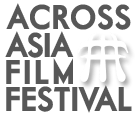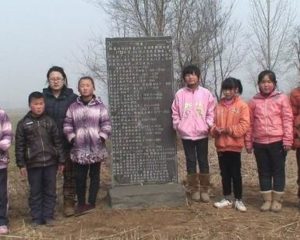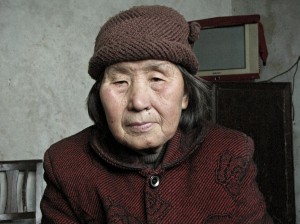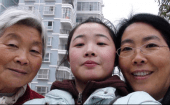Caochangdi Workstation &The Memory Project
Background
Caochangdi Workstation (CCD) found by filmmaker Wu Wenguang and choreographer Wen Hui in Beijing 2005, where based by Wu Wenguang’s film studio and Living Dance Studio. In the same time, Wu and Wen also aim to building the platform for documentary and performance developing, especially for the creation of young artists as an independent space. Since 2005, we have had a series of projects for documentary and performance.
In the summer of 2009, we began a documentary film project to chronicle the events that took place between the “3 year famine” period of 1959 and 1961. By the summer of 2010, we had 21 people participating, making this Caochangdi Workstation’s landmark “folk memory project.” These 21 participants went back on their own accord to their respective villages to interview and take notes for this event. Among the participants were people aged above 60, people with experience in making documentaries, theatre and other arts-related individuals, as well as existing university students. This project had a snowball effect, with an increasing number of participants joining in, creating a large volume of records and village interviews for the archives.
Currently, in this year 2012, we have had 103 participants going back to their villages for interviews, with more 900 interviewees coming from 18 provinces and 130 villages. Interview topics ranged from the “3 year famine”, the “Great Leap Forward,” the “Land Reform” and the “Cultural Revolution,” across different historical periods. In summary, this project is a trial in creating folk memory archives.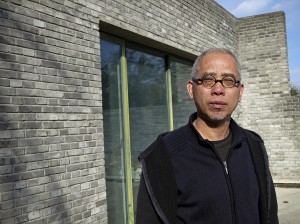
Knocking on Memory’s Door with a Video Camera
A handful of people took video cameras and went back to their respective villages. They went in search of the old generation that was still living there in dim, stark houses. They went to uncover the memories hidden deep inside them. Each filmmaker had some prior relationship to the village. Some of them were born or grew up there, some still live there, some had never lived in the village but had parents or grandparents who had. For the old people in the village, this was the first time anyone had come with a camera to ask them to open their memory chests. Here was the younger generation, leaping over their parents’ generation– that generation wiped clean of memory- to ask the elders about the past. This meeting may be awkward and uncomfortable but it is also an exciting adventure. Their stories are now documentary films presented in this program.
◆Information of 26 films, made by 12 filmmakers 2010 to 2013
➞The films produced in 2010 (total 3 films)
The Starving Village
Directed, Photographed, Edited by: Zou Xueping
Length: 76 minutes
Production: 2010
(Screened: Tampere International Film Festival, Finland (2011), Taiwan Documentary Film Festival, 2011, Independent Film Festival, Hong Kong, 2013)
The Director’s Statement:
I was born and raised in the village. Since 2008, I have begun to document my own life, little by little walking back into my own village with my camera. This is my second documentary film, and it is fully composed of old people. One woman, nearing 80, is living out the last two years of her life. From when she is still using a cane to walk, to when she becomes paralyzed, she is always relying on others to live life. This is my grandmother. We also see other elderly people from the village, their daily activities, the tales of their starvation from 50 years ago. This film rests on these lives: a woman suffering and struggling as she faces oncoming death, and these people who narrate for us the history of rural starvation.
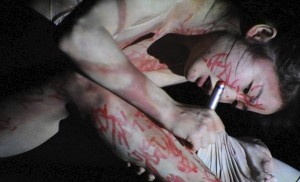 Self-Portrait with Three Women
Self-Portrait with Three Women
Directed, Edited by: Zhang Mengqi
Photographed by: Zhang Mengqi, Zhang Yan
Length: 70 minutes
Production: 2010
(Screened in: Tampere International Film Festival, Finland (2011), Taiwan Documentary Film Festival, 2011, Yamagata International Documentary Film Festival, Japan, 2011, Docudays, Lebanon, 2011, China Independent Film Festival, Nanjing, 2011, Yunfest, Kunming, 2011, Shadows film festive, Paris, 2012, IAWRT Asian Women’s Film Festival, India, 2013, Spielart Festival, Munich, 2013)
Synopsis:
This year I turned 23, the age when women become pregnant with dreams. Yet, even while nursing our own dreams, we must carry the burdens of two other womens’ dreams as well. This film began with my own search, then delving into my mother and her mother, where blood has flowed through three generations, in these women who grew up in such different times. As a victim of an oppressive marriage, my grandmother held hopes for my mother to enter a beautiful, perfect marriage. When my mother became a victim herself, she turned those hopes to me. Marriage may be every girl’s dream, but it is also the murderer of those dreams.
Written, Directed, edited by: Wu Wenguang
Photographed by: Wu Wenguang, Wen Hui, Zou Xueping, Tang Zhi
80 minutes /Beijing Storm, 2010
(Screened: Beijing Independent Film Festival, 2010, Versions du Reel, Nyon, 2011, Yunfest, Kunming, 2011)
Filmmaker’s words:
This film started with me wanting to make a film to memorialize and explore my deep emotions toward my mother, who passed away in 2007. As I was making the film, my thoughts toward it kept getting broken and shifted, especially as I sorted through the 12 years of footage I had collected, seeing subtleties I had previously overlooked, or reliving experiences that had long since gone by. Even more impacting was facing the moving images of my mother, seeing someone dear to me who has already left this world captured with such lifelike movements, utterances, expressions, like it all just happened yesterday. Then I realized this film is not just about remembering her—it’s also an experiment to bring her back to life. Especially at a time when I’m in a process of trying to heal myself, my mother is a crucial element. And so, though my mother/ remembrance/ the present/ healing and self-healing, this film’s structure and way of recounting began to naturally materialize.
➞The films produced in 2011 (total 6 films)
Satiated Village
Directed, Photographed, edited by: Zou Xueping
88min. /2011
(Screened: Beijing Independent Film Festival and won “excellent film award”, 2012. China Independent Film Festival, Nanjing, 2011, Independent Film Festival, Hong Kong, 2013, Yunfest, Kunming, 2013 )
The Director’s Statement:
After completing my previous documentary The Hungry Village, I returned to my hometown to give the first screening of the film to my family. The film was unanimously and fiercely opposed by my family members, including my parents who were born in the 1950s, my elder brother born in the 1970s, and my younger brother born in the 1990s. They were worried that investigating the history of the famine in the village from fifty years ago was dangerous; they also thought that after I had graduated I should find a more stable job instead of interviewing the elderly and making documentaries. I was very much frustrated with my family’s strong objections, and had some doubts and wavered over the path I has chosen; at the same time, I had to re-examine myself and do some soul-searching. It was the first time I had confronted my parents and my family in the 25 years since I was born, and was also the beginning of my rebellion. Fortunately, against the “high wall” of family opposition, I had a steadfast supporter standing with me—my 9-year old niece. She became my little angel. There were also the old folks I had interviewed; they still unswervingly backed me, even though after watching the film, some of them were afraid that a documentary intent on “exposing the history of the famine” would make China a laughingstock if shown to foreign audiences, and then an old man named Xiling spoke out and persuaded them to support me. It is the second documentary of “my village” series since I got involved with the “Folk Memory Project” and returned to my hometown to shoot footage, recording the realities I encountered in my search for memories. My biggest question is: after experiencing the disaster of the tragic famine fifty years ago, the villagers now are not short of food, and are living a better life than before, but is the spirit of this village still starving?
Self-Portrait: At 47 KM
Directed, Photographed, edited by: Zhang Mengqi
77 min./2011
(Screened: China Independent Film Festival, Nanjing, China, 2011, Cinema Du Reel, “International Youth Competition”, Paris, 2012, Yunfest, Kunming, 2013)
The Director’s Statement:
After my first documentary Self-portrait and Three Women, my second “self-portrait” was painted in a village named “47 KM”. This village is located 47 KM from Suizhou, Hubei Province, where my father was born. He left the village when he was 20, but his father, my grandfather, still lives there. In the summer and winter of 2010, through my participation in the “Folk Memory Project”, I went back to the village, which seems disconnected from my current life, and re-discovered and came to better understand my grandfather, the old villagers who underwent the disaster of the famine fifty years ago, as well as the village, which always perplexed and embarrassed me. What does “47 KM” really mean to me? It seems to be like a mirror, I see myself in front of it.
Luo Village: I and Ren Dingqi
Directed, Photographed, edited by: Luo Bing
80 min. / 2011
(Screened: Beijing Independent Film Festival, 2012. China Independent Film Festival, Nanjing, China, 2011, Shadows film festive, Paris, 2012)
The Director’s Statement:
This is my first documentary, and also marks the start of the new life style I chose after graduating from college a year ago. It is a “beginning” in that I went back to the Luo Village in Zhuzhou, Hunan Province, where I was born and raised. My “return” was concurrent with the execution of the “Folk Memory Project”, which began with my interviewing old villagers about their memories of the “three-year famine” (1959-1961). My attempt to retrieve these old people’s memories met with unexpected resistance, including my own grandma’s opposition. She was worried that by touching upon such sensitive matters, I would be heading down a dangerous path. Unexpectedly as well, an old man came into my life. He led me to approach many old people in the village and became my dedicated supporter and comrade. He is Ren Dingqi, my neighbor next door. More surprisingly, this old man from the countryside who only had a couple years of formal education wrote a memoir of hundreds of thousands of words, covering his experiences from the Liberation (1949) until the present, but he did not rush to show me his memoir. What was he worried about? Did he really write the memoir? If so, why? Where did he keep his memoir? I was curious and speculative, at the same time, dubious and yet imagining the possibilities…I approached him again and again with my muddled thoughts, and the process of approaching him allowed me to discover the realities of this village, which were previously unknown to me.
Back to Huamuling
Directed, Photographed, edited by: Li Xinmin
75 min. /2011
(Screened: China Independent Film Festival, Nanjing, 2011, IAWRT Asian Women’s Film Festival, India, 2013)
Filmmaker’s words:
I grew up in Huamuling Village. In 2002, I left the village to make money. I was fourteen years old. Now, seven years later, I take a video camera for the first time and return to my village. I tried to film the life I had lived there and explore my relationship to the village. I also used the camera to interview the village elders about the past.
Listening to Third Grandmother’s Stories
Directed, Photographed, edited by: Wen Hui
75 min. /2011
(Screened: Vienna International Film Festival, 2011, Independent Film Festival, Hong Kong, 2013)
Filmmaker’s words:
While searching for the memories that my entire family has forgotten, I found my third grandmother. She is the only one of my grandparent’s generation still living. She is my father’s aunt, my great-aunt, but neither my father nor my family ever mentioned her to me. Last winter I found her in a village in the mountains of Yunnan. Her name is Su Meiling and she is eighty-three years old. When I met her it was as if she had been waiting her whole life for me to come. Waiting for eighty-three years. I stayed with her and she began to tell me about her life. Through her stories I could see how China’s great changes changed one woman’s life.
My Grandpa’s Winter
Directed, Photographed, edited by: Jia Nannan
30 min. / 2011
(Screened: Tampere International Film Festival, Finland, 2012)
Filmmaker’s words:
I felt I should film my grandfather to try to understand more about him. I never thought about how my grandfather spent his winters. And now, after making the film, I know more. I know more about his thoughts.
➞The films produced in 2012 (total 7 films)
Children’s Village
Directed, Photographed, edited by: Zou Xueping
85 min. /2012
(Screened: China Independent Film Festival, Nanjing, 2012)
Filmmaker’s words:
This film is the third one I have made for the People’s Memory Project, returning again to the same village. In the beginning of 2012, in winter, while continuing my interviewing there, I began investigating and gathering statistics on deaths during The Three Year Famine. I also began soliciting donations for a memorial for those who had died then. Kids from 10-15 years old voluntarily joined these activities, taking the video camera I gave them, visiting old folks, interviewing, and getting statistics, donations. This project gave them a first opportunity to learn about and appreciate their village’s history. With these “Little Angels” help, I suddenly no longer felt alone in the village. I could see the future and its hopes. This film completes my three-film Zou Village Series.
Self-portrait : Dancing at 47 KM
Directed, photographed edited by: Zhang Mengqi
77 min. /2012
(Screened: China Independent Film Festival, Nanjing, China, 2012, Cinema Du Reel, “International Competition”, Paris, 2013)
Filmmaker’s words:
I went back to “47 Kilometers” again this winter and continued to research the people who went hungry in the village. Who were they? What did they go through? Is there anyone who still remembers them? My research concentrated on those who perished during the “three famine years.” I did a series of ridiculous moves in the village. The third film in my
“Self-Portrait” series emerged out of this.
Luo Village: Pitiless Earth and Sky
Directed, Photographed, edited by: Luo Bing
English subtitle translated by Xu Yaping; Proofing: Odette Scott
82 min. /2012
(Screened: China Independent Film Festival, Nanjing, China, 2012, Yunfest, Kunming, 2013))
Filmmaker’s words:
This film is the sequel to my first one, <Luo Village: Me and Ren Dingqi>. Its title comes from Ren Dingqi’s memoir. He spent ten years on this memoir, documenting bone-deep experiences of Land Reform, The Great Leap Forward, the Three Years of Famine, and the Cultural Revolution…My film attempts a reading of his book to try to witness this history once more. At the same time, as I tried to open this memoir before his fellow villagers, I encountered all sorts of unexpected responses, and found myself investigating the links between past and present and whether or not this village is still “pitiless earth and sky.”
Huamulin 2012
Directed, Photographed, edited by: Li Xinmin
75 min. /2012
(Screened: China Independent Film Festival, Nanjing, China, 2012)
Filmmaker’s words:
I returned to my village again in the winter of 2011, anticipating learning more about my village and myself. I discovered more stories on this trip.
Shuangjing Village, I’m Your Grandson
Directed, Photographed, edited by: Shu Qiao
78 min. /2012
(Screened: China Independent Film Festival, Nanjing, China, 2012)
Filmmaker’s words:
This work is based on a story inspired by my family tree. My grandfather pieces the story together. At first he thought it was meaningless but eventually he began telling it. After some time I sensed a shift in him, and in the end I got closer to my grandfather.
Attacking Zhanggao Village
Directed, Photographed, edited by: Wang Haian
86 min. /2012
(Screened: China Independent Film Festival, Nanjing, China, 2012, Spielart Festival, Munich, 2013)
Filmmaker’s words:
After joining the Folk Memory Project in 2010, I went back to my village and began interviewing my grandpa and other elders. I was digging up memories of the three years of hunger, from 1959 to 1961. I hoped to join the other participants and erect a commemorative headstone for the villagers that died in 1960. However, the idea met strong opposition from my village and family. Even though I collected the deceased names and ages, I wasn’t able allowed to put a headstone in the public cemetery.
Investigate Jia Zhixiu
Directed, filmed, edited by Jia Zhitan
80 min. /2012
(Screened: Yunfest, Kunming, 2013, Beijing Independent Film Festival and won “excellent film award”, 2013.)
Filmmaker’s words:
I was nineteen in 1970. In the village where I lived then and now, some villagers accused other villagers of being counterrevolutionary. It was a tragedy as these accusations were completely unfounded. There were more than 80 people involved in the case. Now, forty years later, the villagers don’t mention this event, (except a very few who still hold grudges). Most people are confused about what happened and the new generation has never even heard about it. As a member of this village I decided to investigate. When I was nineteen I was just a witness trying to avert my eyes, but now I open them wide to learn about this event and its influence on the village today. I think this is my responsibility. I have to reflect on my role as a villager.
➞The films produced in 2013 (total 10 films)
Directed, Photographed, edited by: Zou Xueping
82 min. /2013
(Screened: China Independent Film Festival, Nanjing, China, 2013)
Filmmaker’s words:
This is the fourth film in my Zoujiacun series within the Folk Memory Project. In 2013, I came back to my village and faced the trash all over the village. The children and I tried to improve the environment of our village. This was a tough fight against the trash and ideas of villagers. I felt like that the trash was in my heart. The 95-year-old grandma Sha and her 49-year-old son Xizhu, their lonely solitary life is also in this film. This film is about the progress that I fight with myself.
Self-portrait : Dreaming at 47 km
Directed by: Zhang Mengqi
77 min. /2013
(Screened: China Independent Film Festival, Nanjing, China, 2013)
Filmmaker’s words:
This is the fourth film in my self-portrait series. I went back to the village named 47 km in 2013. My grandfather was critically ill, and I accompanied him like accompanied the death. The old people and their memories are like dead leaves. I got familiar with the children and we acted together to build a bookroom in village. Between the solitary old people and the naïve sunshine children, can I find my dream here?
Huamulin, Boy Xiaoqiang
Directed, Photographed, edited by: Li Xinmin
76 min. /2013
(Screened: China Independent Film Festival, Nanjing, China, 2013)
Filmmaker’s words:
This film is about one four-year-old boy. His mother is Xiaoqun, just in my age. I filmed Xiaoqun and her family last year. This year I went on. In this process, I find Xiaoqiang so interesting. He played and picked up rubbish together with me. I also saw old people’s real life and found that villagers were destroying the environment. All of these consist my film.
Luojia Village: Farewell, Luojiang Bridge
Directed, filmed, edited by Luo Bing
73 min. /2013
(Screened: China Independent Film Festival, Nanjing, China, 2013)
Filmmaker’s words:
Luojiang Bridge was the oldest arch bridge in my village. When I was young, I went over the bridge to school every day. That bridge carried the memory of several generations in village. In 2013, this bridge was dismantled. I heard the noise of breaking it down and felt impotent. I remembered the old people’s famine stories. The bridge and old people are destined to be off-stage. Will they leave any marks?
Believing in Zhanggao Village
Directed, Photographed, edited by: Wang Haian
71 min. /2013
(Screened: China Independent Film Festival, Nanjing, China, 2013)
Filmmaker’s words:
This is my second film, and it is created within the Folk Memory Project. In 2013, I went back to my village again, and tried again to erect a monument for the people died in 1959-1961 famine. And I encountered the same opposition. I came into the village church and fell into the eddy of religion. I was determined to do more specific things for the villagers, so I taught the children to draw and helped the solitary old people…
Shuangjing Village, I Want to Marry You
Directed, Photographed, edited by: Shu Qiao
74 min. /2013
(Screened: China Independent Film Festival, Nanjing, China, 2013)
Filmmaker’s words:
This is my second film in the Folk Memory Project. In 2013, I went back to my alma mater Shuangjing middle school, taught the students to shoot and interview old people’s memories in their villages. At the same time, I went back to my grandmother’s village Shuangjing, listened her own stories and executed the Old People funding with my grandfather. I tried to help the old people in village and also faced troubles.
Grandfather, Great Famine
Directed, photographed, edited by: Guo Rui
75 min. /2013
(Screened: China Independent Film Festival, Nanjing, China, 2013)
Filmmaker’s words:
I have never met my grandfather, because he died before I was born. My parents mentioned my grandfather not much, so I knew little about him. In 2013, I went back to my father’s village, where he was born and brought up, to interview the old people experienced the 1959-1961 famine. This progress revealed my grandfather’s image gradually.
Why did I go back to this village? I was neither born nor brought up here. I had no nostalgia. I think I am tracing the origin and power of my name. During my interviews, I constantly told the old people I was the granddaughter of Guo Gaoling. And this was the only way that I went close to the village people. I was increasingly curious about my grandfather after I knew that he was a cadre. How did he behave as a village head in the great famine? How’s his daily life? What’s his power and duty? At the same time, I was collecting the death stories and death names in the great famine.
For me, grandfather and the great famine seem to be the chance and guide to my hometown.
I Want to Be a People’s Representative
Directed, filmed, edited by Jia Zhitan
78 min. /2013
(Screened: China Independent Film Festival, Nanjing, China, 2013)
Filmmaker’s words:
I am a peasant. I participated the Villager Documentary Project and I have been making documentary films for eight years. In 2012, my county people’s congress started the changeover. I kept speaking for the people in my village and solving their problems, so I believed myself eligible for a People’s Representative. So I took part in the candidate elections and hoped that I could do better for the villagers. The outcome was expected and I recorded the progress of fighting for the legitimate rights and interests of citizens with my camera.
Because of Hunger: Diary I by Wu
Directed, edited by Wu Wenguang
90 min. /2013
Filmmaker’s words:
The film is about the first two years in the Memory Project. All images was from my angle with my camera.
Old People and My Village
Directed, edited by Hu Tao
70 min. /2013
Filmmaker’s words:
I have to believe in a world outside my own mind .I have to believe that my actions still have meaning.
◆Information of the filmmakers
Zou Xueping, was born in 1985. In 2009 she graduated from the China Fine Arts Academy. She is currently a resident artist at CCD Workstation. She has documentaries Mom (2008), The Starving Village (2010), Satiated Village (2011) won “Excellent Award” of Beijing Independent Film Festival 2012, Children’s Village (2012) and Trash Village (2013).
Zhang Mengqi, was born in 1987. She graduated from the Dance Academy of China Minorities University in 2008. Since 2009, she has been a resident artist at CCD Workstation. She has created documentary films: Self-portrait with Three Women (2010), Self-Portrait: At 47 KM (2011), Self-portrait : Dancing at 47 KM (2012). Four films complete her own “self-portrait series”
Li Xinmin, was born in a montanic village in Yunnan Province in 1988. She had just got the education for four years and had to stopped for the financial problem. She started to work to provide for her family in the city when she was 16 years old. Since 2007, she works in CCD Workstation. She has completed her documentaries Back to Huamulin (2011), Huamulin 2012 (2012) and Huamulin, Boy Xiaoqiang (2013).
Luo Bing, was born in 1986 and graduated from the China Fine Arts Academy in 2009. Since 2010, he has been a resident artist at CCD Workstation. He has documentaries Luo Village: Me and Ren Dingqi (2011), Luo Village: Pitiless Earth and Sky (2012) and Luojia Village: Farewell, Luojiang Bridge (2013).
Shu Qiao, was born in 1989 and graduated from Tianjin Fine Arts Academy 2012. Since 2010, he participated the Memory Project and is currently a resident artist at CCD Workstation. He created his documentary Shuangjing Village, I’m Your Grandson (2012) and Shuangjing Village, I Want to Marry You (2013).
Wang Haian, was born in 1988 and graduated from Tianjin Fine Arts Academy in 2012. Since 2010, he participated the Memory Project and backed to a village where he was born. Now he has his first documentary Attack Zhanggao Village (2012) and Believing in Zhanggao Village (2013).
Jia Zhitan, was born in 1950 in Yuanyichang Village, in China’s Hunan Province and he’s been a famer till now. In 2005 he joined Caochangdi’s Villager Documentary Project and completed a documentary short entitled “Quarry.” Since then, he has completed his a series of feature-length films: My Village 2006, My Village 2007, My Village 2008, My Village 2009, Investigate Jia Zhixiu (2012), I Want to Be a People’s Representative (2013)
Guo Rui, was born in 1988, at Linying county, Henan province, graduated from History Department of Henan University in 2009, graduated from History Department of Nankai University with a master degree in 2012, and work in CCD Workstation since 2012. Grandfather, Great Famine is her first documentary.
Jia Nannan, was born in 1991 and now works in CCD Workstation. My Grandpa named Jia Fukui is his first documentary film.
Hu Tao, was born in 1993, and study currently in the film and television photography in Xi’an Academy of Fine Arts.
Wen Hui, was born in 1960, is a choreographer and dancer. She studied choreography at the Beijing Dance Academy and graduated in 1989. In 1994 she founded Living Dance Studio in Beijing with Wu Wenguang. In the following years she created and choreographed many performance pieces that toured worldwide. In 2005 she and Wu Wenguang founded CCD Workstation, an independent art space in Beijing. Listening to Third Grandmother’s Stories is her first documentary film (has selected by Vinenna International Film Festival, 2011, Beijing Independent Film Festival, 2012).
Wu Wenguang, was born in south-western China’s Yunnan province in 1956. After graduating from high school in 1974, Wu was send to the countryside, where he worked as farmer for four year. Between 1978 and 1982, he studied Chinese Literature in Yunnan University. After the University, Wu worked as a teach at a junior high school for three years, and later, he worked in the television as a journalist for four years. Wu left the television, moved to Beijing in 1988 to be an independent documentary filmmaker, freelance writer and creator and producer of dance/theater. Wu has completed documentaries, which like Bumming in Beijing (1990), 1966, My Time in the Red Guards (1993), Jiang Hu: Life on the Road (1999), Fuck Cinema (2005), Treating (2010).In 2005, Wu co-funded the independent art space Caochangdi Workstation with Wen Hui in Beijing. Since then, Wu found two main projects: Village Documentary Project (found in 2005) and Folk Memory Project (found in 2010).

